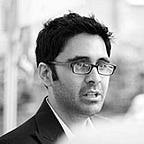The Essence of Leadership
What Being a Leader is Really About
Consider a striking paradox. Interest rates are turning negative. Middle classes are shrinking. Yet leaders refuse to heed the message, and invest in them.
It’s hard to tune out the increasingly hysterical headlines. But they obscure a harsh reality. When leaders fail at their fundamental task, sparking prosperity, it’s hard to blame people for turning to demagogues who mirror their bitter frustration.
The point isn’t to condemn. It’s to understand the larger issue.
Just as political leaders are failing societies, so business leaders are failing constituencies, too. Increasingly, they are rewarded for running companies into the ground— not for building the kind of historic institutions that enduring prosperity is anchored upon. It’s one thing for an economy to grow by mortgaging yesterday. It’s another for it to really prosper by investing in tomorrow. Today there is a great divide between growth and prosperity. The difference between the two is made by leaders.
There is something deeply wrong at the very heart of leadership. The forging of leaders is a subtle thing. Part education, part culture, part values. Yet the visible truth is that institutions are not really producing a high calibre of leaders anymore — something more like low quality leader-like products, Leadoritos, figureheads that look and maybe sound like them, but rarely act, behave, imagine, create, give, hold, rebel, defy like true leaders should.
What is leadership? Leadership is simply the courage to love in an uncertain world. Leaders love us despite our human frailties and flaws. That is how they lead us to lives that matter. And so, though it may take a while, that is why we love them back — and follow them. It’s as true for Malala and Jobs as it was for Lincoln and Gandhi.
Our real task is difficult. “To love in an uncertain world” is an abstract statement, of values, obligations, beliefs. We have the hard work of interpreting it. What does it really mean to practice it?
Leadership, then, is a way. It is the way of constantly interpreting and reinterpeting what it means to have the courage to love. To really embody it and spark it.
Maybe you do not like my emotional terms. You prefer hard, cold rational ones. Now we come to the heart of what has gone wrong in leadership. You and I can’t compute, calculate, algorithm our way to a better world. Logic and rationality can guide us, but it can never really illuminate the way to shared human progress for us.
Consider the leaders who aren’t investing in collapsing middle classes even while interest rates are negative. It’s irrational for society. But it’s rational for them. They’ll prosper either way. Why bother doing the hard work of real leadership? So this kind of self-interested calculative rationality isn’t enough to produce the kind of leaders the world so visibly needs.
Nor is inspiration, influence, manipulation, horse-trading, deal-making — the vast bulk of what we’ve come to call leadership. It’s better just to call it “interpersonal negotiation”. It may be necessary. But it’s surely not sufficient for leaders. You can horse-trade a better deal — but unless you have some real spark of love beating in your heart, it will probably just be for you.
An act of love in an uncertain world. Behind the headlines, beneath the fear and outrage, we remain who we are. Human. Little fragile things in a big unforgiving world. And it is the task of those who wish to be true leaders to grasp the essence of this high human art. In each of the little fragile things we call ourselves lies infinite possibility slumbering, waiting to be awoken.
Umair
Washington, DC
August 2016
